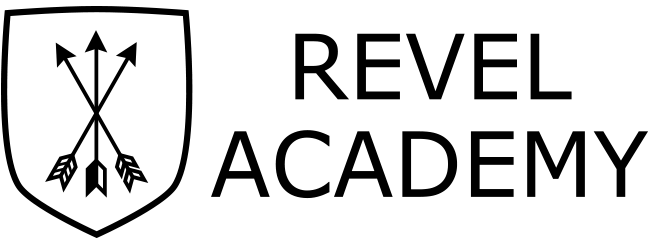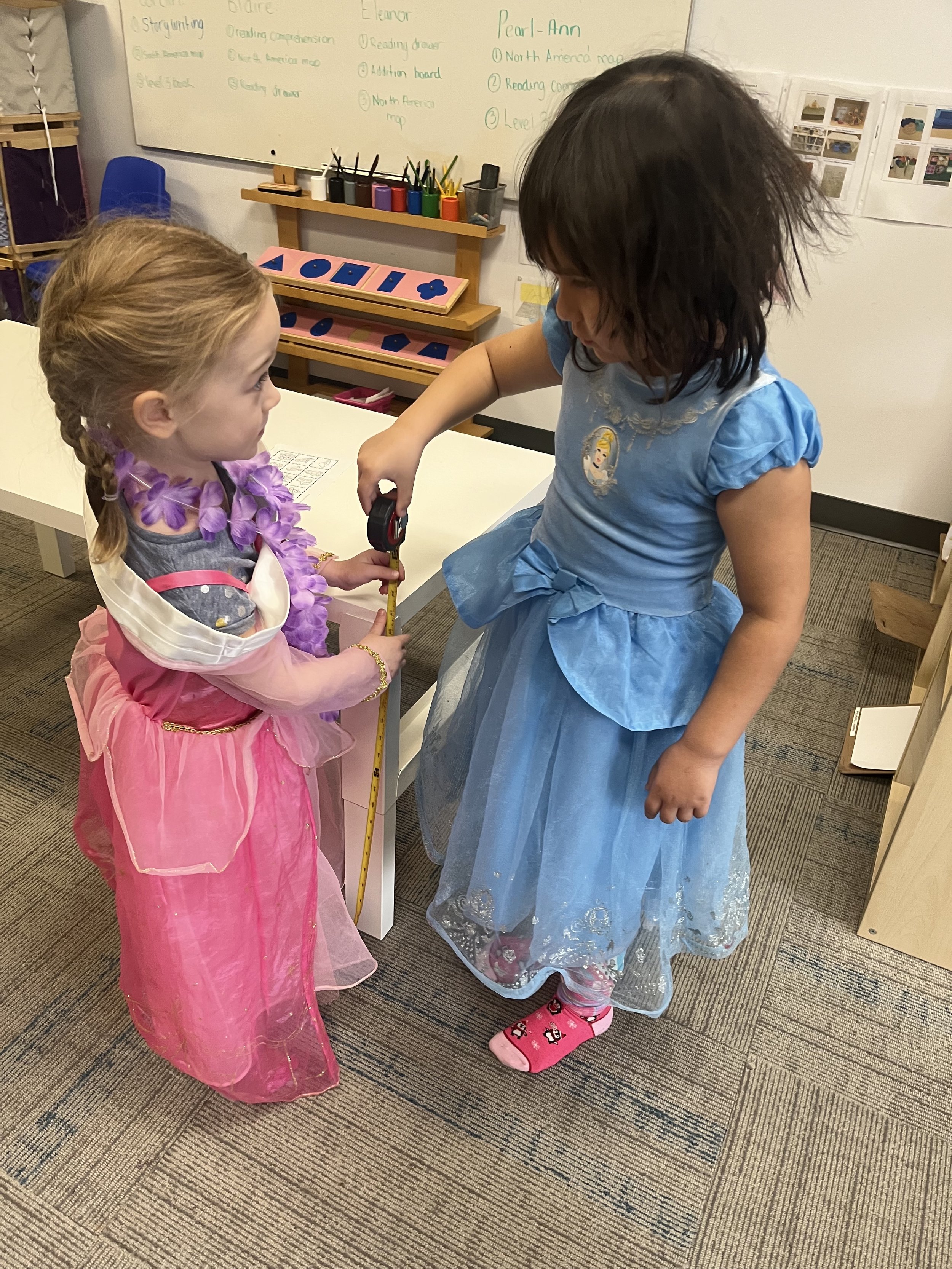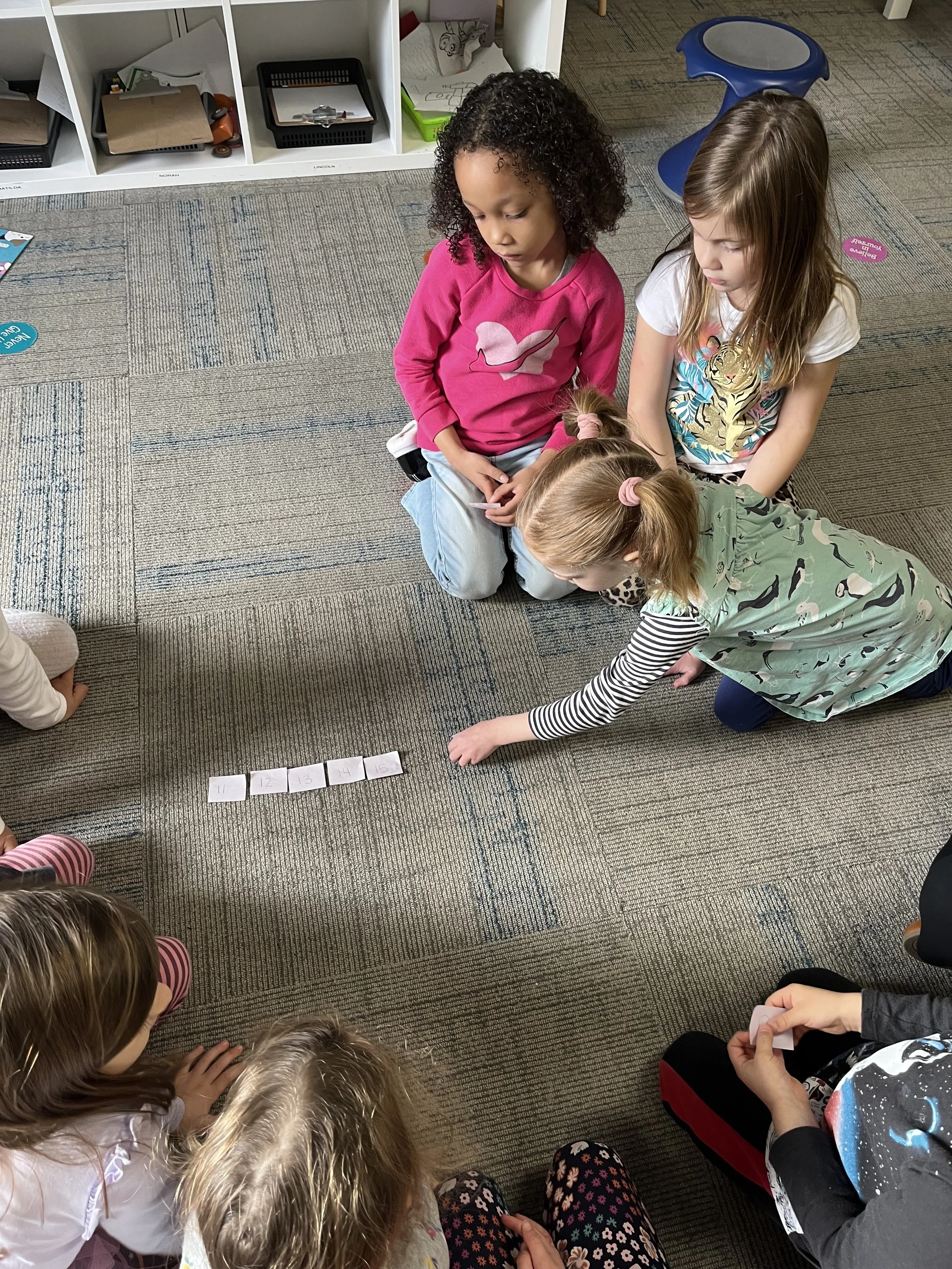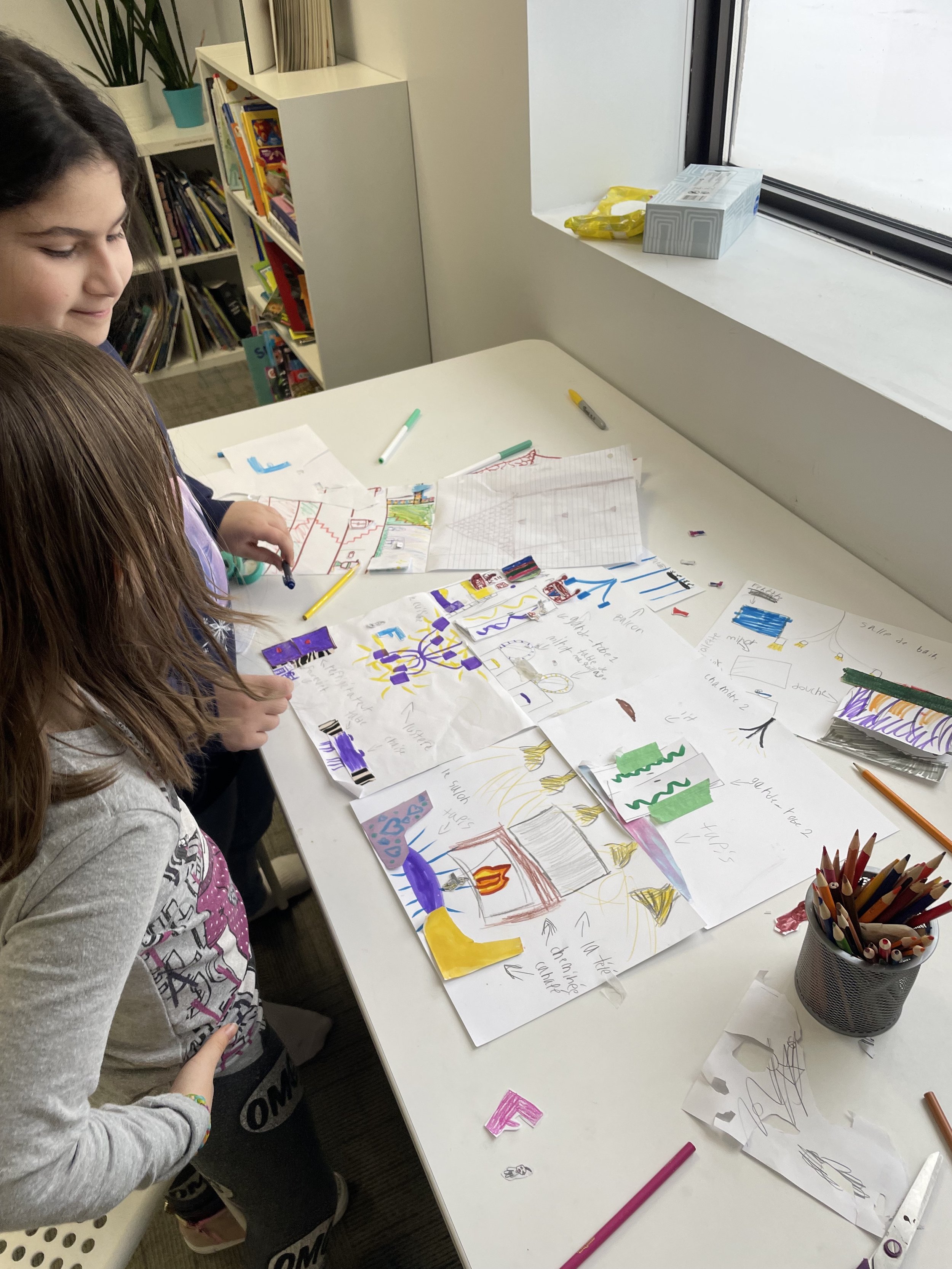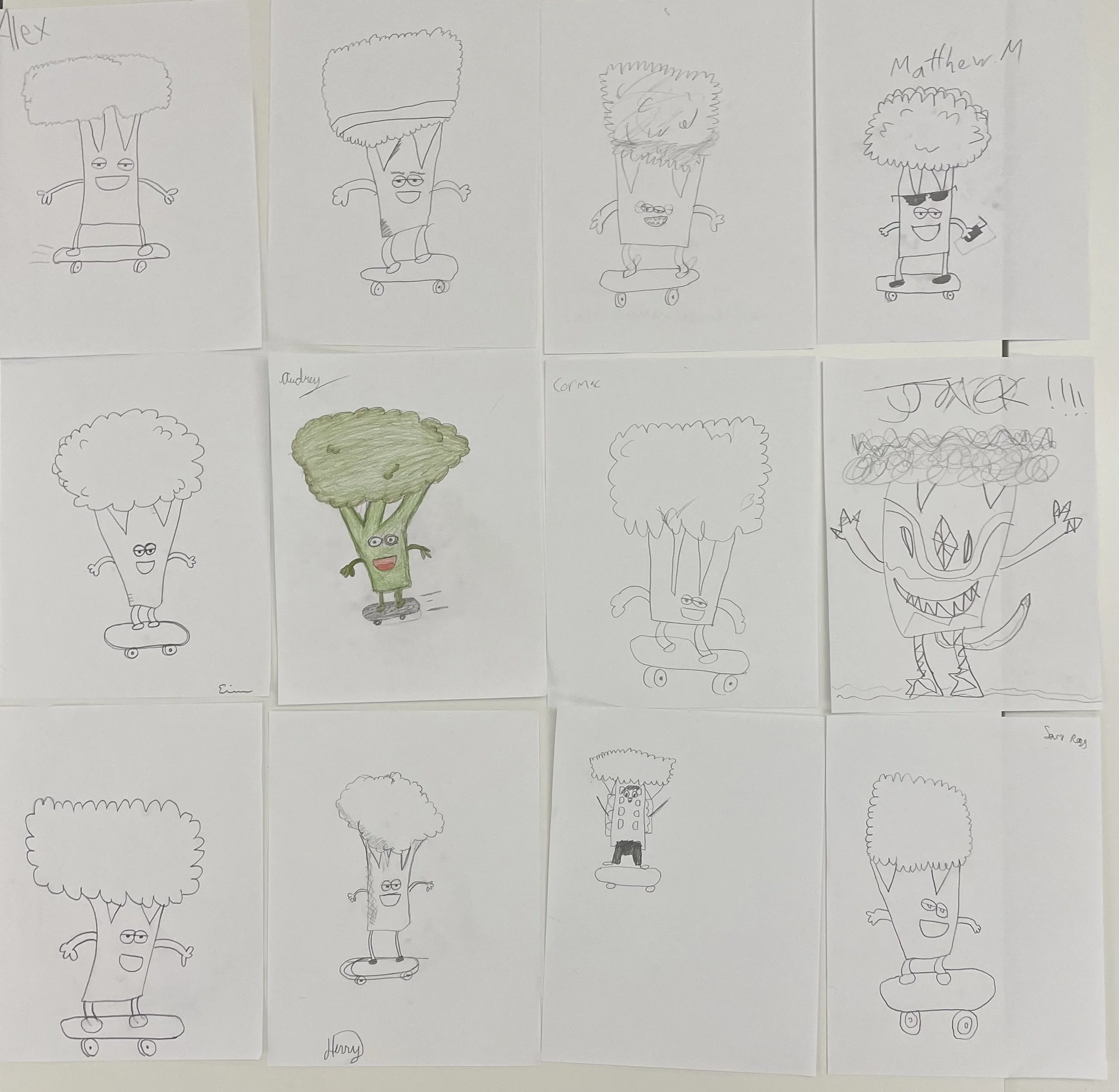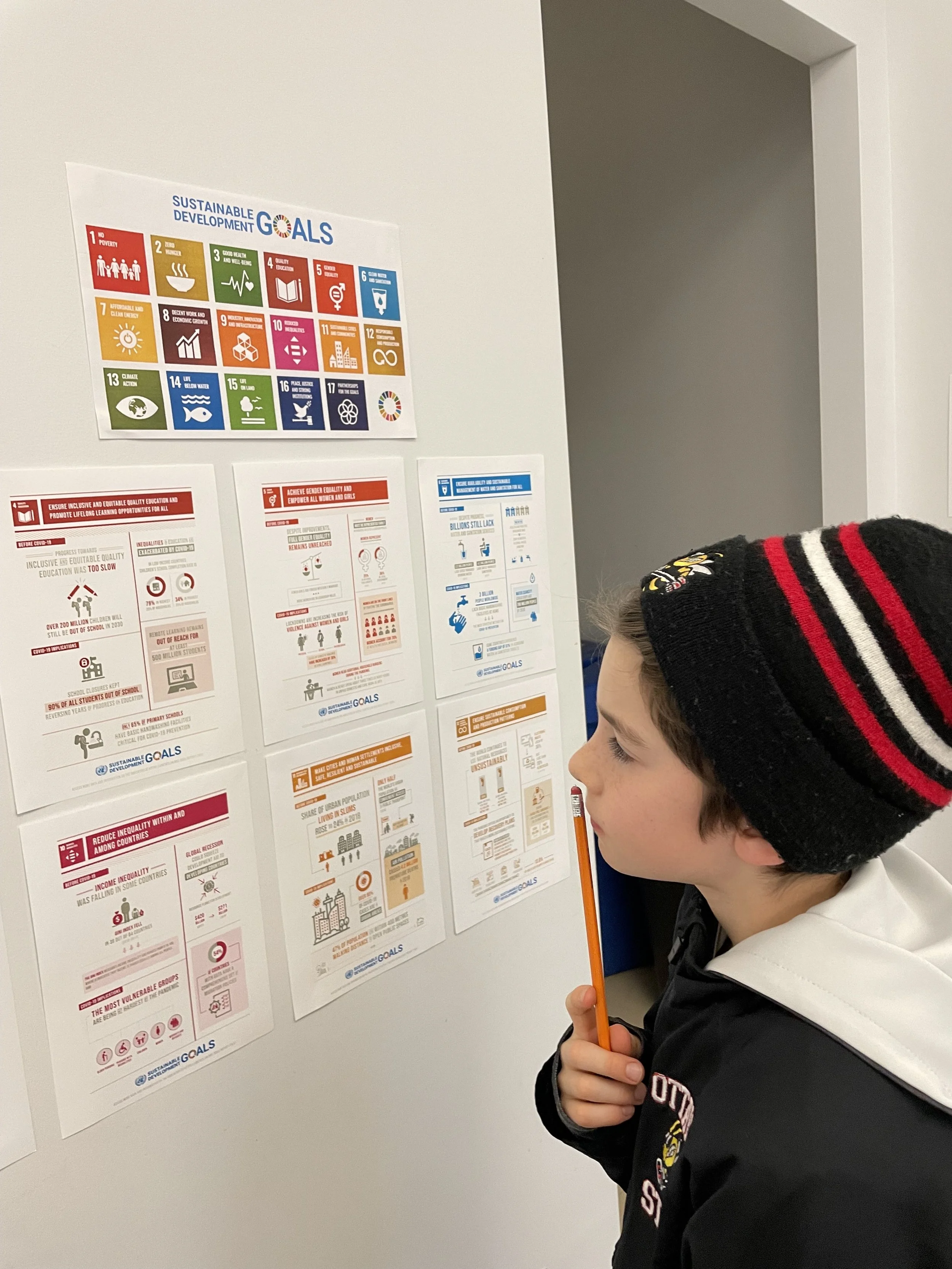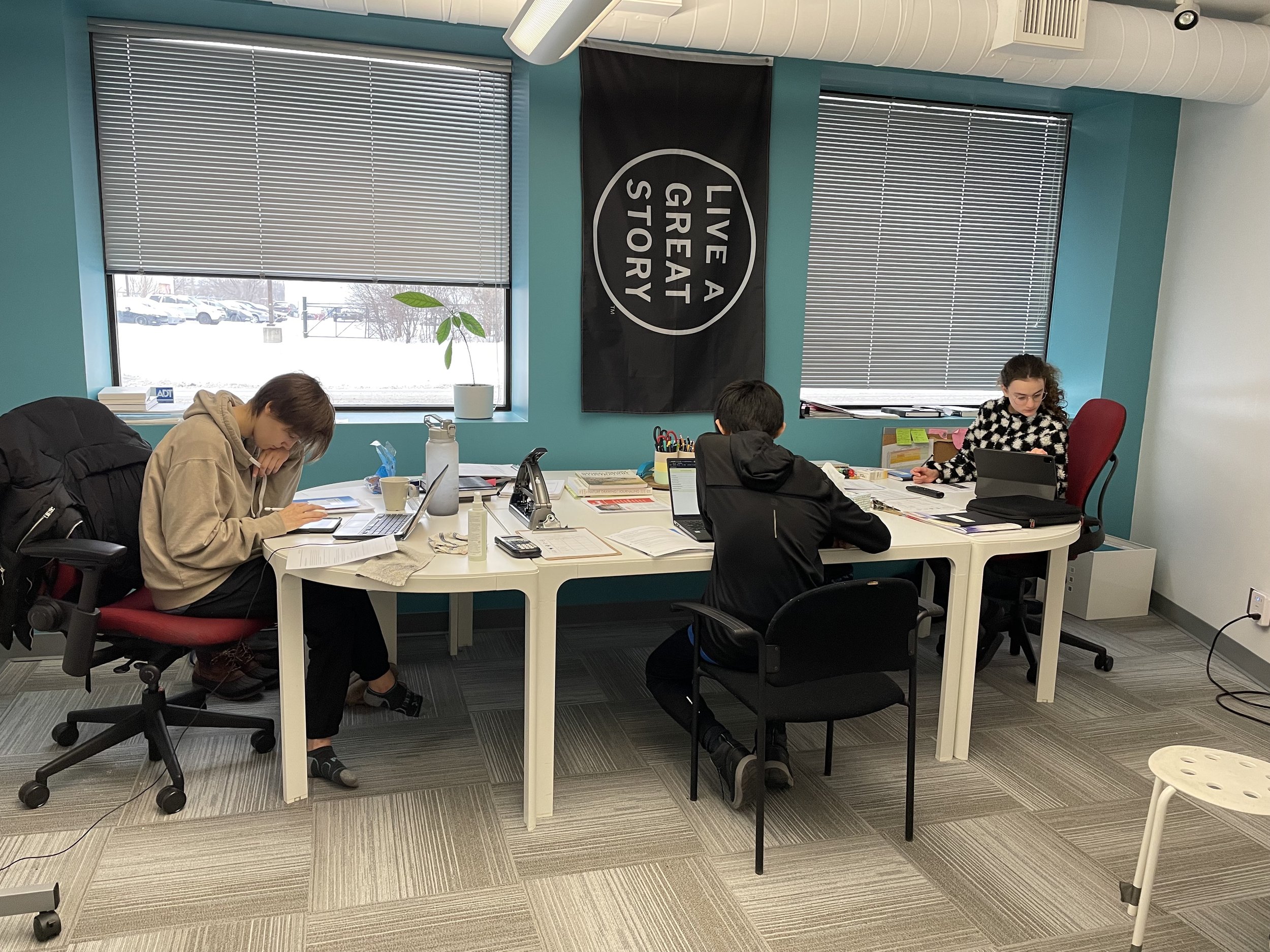Revel Recap: January 9-13, 2023
Spark Studio
Mindfulness
Welcome back, Rebels! To kick off Session 4, our affirmation of the week centred on responsibility. The Sparks repeated, "I am responsible, I am reliable, I am accountable, and I feel good about the choices I make." As a studio, we shared when we took responsibility for our actions and how they made us feel. We spoke about the importance of accountability and how we will use it throughout the session, as we take on the role of mighty construction workers! Tuesday the Sparks drew a hammer and saw using a guided Arts for Kids Hub video. Wednesday's podcast, "Responsibility; Mighty Monster Truck William and Turner's Star Squad," was a story of Truck William following their responsibilities which led them to the dreams they set for themselves. The Sparks then had a group discussion answering the following questions, "What are the responsibilities that you have in your life?" and "Why is it good to be responsible for the jobs you have?" To stretch our bodies and get our minds ready for Thursday, we followed along to Cosmic Kids Diggery Dump Truck yoga. To end our week as a studio, we gathered around our TV fireplace, coloured together, and had lovely conversations about the snow day!
Quest
Heavy machinery, tools, building, measuring, and construction zone safety were the main topics in the Spark Studio this week! Before beginning our week's construction journey, we spoke about safety. As a group, we agreed that wearing shoes was super important, and we pretended to add our hard hats, vest, goggles and gloves. We started our week with a big challenge, constructing a wooden crane. This project will likely take a few more weeks as the Sparks have discovered some errors in the construction. As a studio, we spoke about trial and error and how learning from our mistakes when building makes us become better builders. It's all about the learning experience within themselves and as a team! We also worked on our shapes because the Sparks recognized that we would use many forms while building. We used marshmallows and toothpicks to create cubes, trapezoids and rectangles. With shapes and constructing objects, measuring is essential! The Sparks used measuring tapes and had to find objects in the studio that were a specific height or width. After this activity, we gathered and talked about how construction jobs have a set budget when working on a project. After our discussion, learners participated in a STEM activity where groups were given pieces of broken boxes, screwdrivers and 16 screws to put the box back together.
On Thursday, the Sparks were shown the big white table, which will be part of a project we will work on for the following five weeks; building a city! What's the name of our city? What's the population? What amenities will there be? You will find out at this session's Exhibition! To start our city, the Sparks worked on building the roads. To end the week we read the story, Let's Meet a Construction Worker by Bridget Meos. It was about construction safety, trucks, and building a school. The Sparks then created fantastic construction vehicles using Lego which will be added to our city!
French
The Sparks will be learning all about animals in French this session! On Monday, we completed a colouring game to begin learning new vocabulary. Tuesday, we played an animal dice game where we had to roll the dice and say the animal's name in French before making the sound of that animal. We had fun playing games in the gym on Wednesday to review the vocabulary we had learned so far, and Thursday, we started colouring animal masks to play a game next week. We read the book Assez, c'est assez (Enough is Enough) to practice our winter words and animals on Friday.
Math
In the Spark Studio, we set math goals daily but dedicate one work period a week to meet in smaller groups. Group 1 worked on number recognition, counting, and the number rods activity. Group 2 came together, set goals, and worked together to complete them, including work with the addition and subtraction charts and Zingo!
Additional Highlights
Starting next week (Week 2), Spark Rebels will go sledding at the hill on Fridays at recess! Please confirm on the Revel Rebel BAND group sign-up for the Spark Studio to ensure your Rebel has permission and what they need in order to participate on Fridays!
Thank you to our families for bringing in various tools this week. All of the Sparks had the opportunity to play with hammers, screwdrivers, drills, measuring tapes, and much more!
Discovery Studio
Mindfulness
The first mantra of the new year was, "I am knowing." The Rebels watched a short clip about words of wisdom that people have to offer others throughout their academic journey from kindergarten to adulthood! Using this as inspiration, we started writing letters to be opened in the future to support whoever reads them with the wisdom we have now. Tuesday, Rebels did a "Top 5 in My Mind" activity, reflecting on the top 5 moments from their winter break that brought them the most joy or gratitude. Wednesday morning the Rebels got cozy around the "fire" with some mindful colouring and this continued with Thursday morning's snowy start! Feel-good Friday brought back Boomwhackers - inspired by a rendition of Blinding Lights, the Rebels tried to incorporate claps and percussion into their songs!
Launches
On Monday, Rebels picked their "Word of the Year" to set the tone for 2023, with the idea that their actions would consistently relate to their chosen word throughout the new year! Growth, perseverance, strength, confidence, organization, focus, and maintain/stay on track, were just a few of the wonderful words our studio expressed to kick off our first day back. On Tuesday, the results of the Session 4 Squad Leader election were announced and the Rebels reset the Core Skills workspaces with new seating arrangements. They are working towards a studio challenge - we will have a pizza party if every Rebel earns Fun Friday two weeks in a row! On Wednesday the Rebels explored some of the weirdest by-laws and regulations from around the country before selecting one to make a sign for - what exactly would you draw to indicate that you can't make any purchases with more than 25 loonies?! Thursday's launch was meant to inspire, with the Rebels reflecting on their progress and collective points from the Caribou Math Contests. Next week is the third round of the contest and if they reach the following points threshold, 300 collective points, they plan to celebrate with ice cream! Friday's Current Events report featured: the cutest bus ride ever, South Koreans reverting the way they measure age and the new potential owner of the Ottawa Sens!
Reader/Writer
Rebels began their first Reader/Writer workshop of the session with a deep dive into Facts vs. Opinions. Rebels defined facts as "accurate," "statements that can be proven based on evidence," and "no matter who says it, it will still be true." Our discussion on opinions focused on how people might "think, feel, or believe" about a topic or statement. As we will be collecting evidence to support our stances for our upcoming Quest debate this session, Rebels practiced expressing their opinions on a current events issue very near and dear to their hearts: Squishmallows! Rebels read and responded to the article and formed their opinion with 2-3 supporting points to back up their opinion statement. As Reader/Writer unfolds this session, Rebels will be creating three written responses of their choice to a variety of debate topics. They will grow more comfortable using opinion templates to assist in organizing their evidence and develop our new word wall to encourage the use of critical language that will help us express our opinions with the goal of making others think, not necessarily changing how they feel.
Math Lab
The Rebels will investigate how and why governments might use data and graphs in this session! To link with this week's Quest theme of municipal government and local public transit, the Rebels broke into two teams to use tally charts and multi-bar graphs to monitor the impact of an environmental commute challenge in a school community. They carefully tallied how many families used various transportation methods to school (walking, cycling or driving) and compared how this changed over time as more and more community members responded to the challenge. They looked for trends in the data and then discussed how the city council might use this data to drive policy or priorities. For example, several Rebels suggested that cycling pathways and sidewalk maintenance would be necessary since many families were walking or cycling rather than driving!
French
In this session, we will learn about animals in French. To kick off the week, we played paper games to learn the vocabulary and met in our new French squads to practice together. We also completed a Kahoot on animals and started an "Animal Edition" game to review our vocabulary.
For our weekly Fench workshop, we will be creating a restaurant. We will work on learning how to order food and take meal orders in French, preparing us for jobs, travel, and everyday life in the future!
Civilizations
Our adventure through the Middle Ages continued this week with the story of Justinian, the just emperor of the Byzantine Empire. The Rebels did a phenomenal job recalling how Constantinople came to be a city through the split and eventual fall of the Roman Empire. They discussed their favourite part of living at that time: the population, economy, education or monuments. It was also fantastic to hear them use the opinion and evidence template from Reader/Writer when speaking and challenge themselves to uphold the ROE of not repeating what has already been said. Great discussion, Rebels!
Quest
The Rebel Government is in session! This week, the Rebels started to explore the levels of the Canadian government and then worked as Rebel City Councillors to research and debate public transit in the city of Ottawa. On Tuesday, the Rebels assumed ward teams and gathered to complete their first team challenge. They mind-mapped ideas about the most pressing issues in our school, city, province, country and world. The quality and depth of their responses will earn them extra speaking minutes at Exhibition for our debate. For their individual challenge, they had to use information from this video from the Parliament of Canada to determine which level of government would be responsible for different scenarios. For example: is being fined for littering in a park a municipal, provincial, or federal issue? This work earns each Rebel Councillor points that can be cashed in later for other advantages in the debate, such as access to their notes or topic selection. Wednesday, the Rebels took part in their first At Issue Workshop! They investigated the public transit options in Ottawa and began to learn about the plan, construction, service and controversy of the O-Train Line 1 (light rail transit or LRT). They also learned about the role of journalism in reporting on and holding governments accountable with critical questions. The Rebels brainstormed questions they would ask local city councillors or Mayor Mark Sutcliffe if given a chance in a media scrum. On Thursday, they used the OC Transpo Travel Planner to see how long it would take them to get to school using public transit - the results varied greatly!
Physical Development
In PE on Monday, Rebels had outdoor free play in the snow at the park. Wednesday's this session, we will be utilizing our PE time for special dance classes with the goal of Rebels creating their own Tik Tok dance choreography that incorporates three exercises!
Additional Highlights
Starting next week (Week 2), Discovery Rebels can skate at the park on Tuesdays and go sledding at the hill on Thursdays at recess! Please confirm on the Revel Rebel BAND group sign-up for Discovery Studio to ensure your Rebel has permission and what they need to participate!
Exploration Studio
Mindfulness
Welcome to 2023! We began Session 4 by reflecting on the past year and thinking about what we want to accomplish in the year ahead. Rebels then reviewed a list of words and selected one to be their focus or mantra for the year. Some of the words chosen were Change, Release, Represent, Courage, Connect, Grit, and Joy. Tuesday morning's yoga started with a slow flow, low to the ground, focusing on side-body stretches. We completed a guided drawing of skateboarding broccoli on Wednesday, and Thursday's yoga consisted of stretching, breathing, and relaxing savasana. Based on learner requests, Rebels can learn how to crochet or knit during Friday's mindfulness sessions. Thankfully, one of our learners is a crochet master who helped get us started this week!
Launches and Closings
After coming up with our own Words for the Year on Monday, we discussed the 2022 Dictionary.com word of the year, "woman." We discussed the news stories and why "woman" was searched so frequently in 2022. How has Athens influenced governments around the world? After reading more about democracy, we read an article about the government in Switzerland. In keeping with our Quest, Design for Change, on Wednesday, we learned about a group of young people from Colombia who significantly improved their community by making "eco logs" from coffee production residue. On Thursday, we debated whether the biggest plague to government is complexity, populism, or corruption. Votes fell close to ⅓ across the board, with a great discussion explaining each view. Friday's learner-led Current Events presentation taught us about okapis, the history of the number 13, news regarding the Australian Open, and of course, "Live From Snack Time" quotes.
Civilizations - Rules without Rulers
This week we finished up our study of democracy. After Tuesday's launch on how Athens influenced governments worldwide, we discussed what we felt was the definition of a true democracy. Was Ancient Athens the closest thing we've ever gotten to a true democracy? After completing some research on ancient Athens, Rebels discussed a series of case study questions. Using writings from Pericles, Aristotle and multiple professors, learners could answer the questions while citing evidence from each source. We learned about who had the right to vote in Athens and how someone became "enrolled" as a citizen. We also debated whether ancient Athens' political system was more or less democratic than the democracies we think of today.
Math Lab
This session's Math Lab theme is (in)equity. We started this week with a discussion about equality vs. equity vs. justice. We used a series of images of people watching a soccer game as a metaphor for global issues like household income, homelessness, disease etc. When resources are distributed equally, and everyone gets the exact same, this is equality. However, the Rebels noted this is different from fairness. In the image, some fans could not see the soccer game over the fence. When resources are redistributed, this can create more equitable outcomes - everyone gets what they need. To see over the fence, some fans don't need boxes to stand on, while others need more than one. Justice is when the systemic barrier in question has been removed and the cause of inequity has been addressed - in this case, the fence has been replaced with chain-link instead of wood and everyone can see without any accommodations needed. For the next several weeks, the Rebels will select a topic and tell its story of equality, equity, and/or justice through data displays on an infographic. They started by browsing the Our World in Data website and will lock in a topic next week.
Reader/Writer
Reader Writer kicked off with a great discussion on Social Justice and Poetry. Rebels discussed elements of Social Justice that were important to them and brainstormed how poetry could be used as a platform to shine a light on social injustices happening in the world around us. Our first poem, "Activism, Everywhere" by Mahogany L. Browne, allowed Rebels to practice their annotation skills using the TPCASTT method (examining Title, Paraphrasing, Connotation, Attitude, Shift, Title, & Theme). When we brought our team back to debrief and discuss the poem, Rebels participated in a meaningful discussion on the deeper meanings and feelings the author was trying to evoke. Rebels agreed that talking about and learning about activism is important, but taking it one step further and actually doing something with our voices has a further impact on our society.
Quest - Design for Change
In this session, we will practice the design process while completing a series of sustainable design challenges and creating a unique invention to solve a problem we've identified. We began by learning about some of the coolest sustainability innovations of 2022, including lunar agriculture and printed solar panels! After learning more about the fields of engineering and the difference between an inventor and an innovator, we focused on sustainable inventions and the life cycle of designs. "Inventing Green" sometimes means creating inventions specifically to solve environmental issues (such as inventing a new solar panel); however, it also means solving everyday problems in an environmentally friendly way. As we invent or innovate this session, learners will be asked to think through; Where will the raw materials come from to make the invention? How will it be manufactured? How much energy will be used to make it? What will happen to the invention when it is no longer useful? Can it be recycled, reused, or composted? Learners then reviewed the design process before brainstorming what they feel our planet's biggest problems are and ways that we could alleviate or solve the issue. Rebels took time in their new lab notebooks to take notes, sketch, label, and draw potential design ideas.
On Tuesday, Rebels were challenged to design an airplane using paper and a spoon that reduces drag and flies fast. Using the design cycle, we began by defining the problem. What forces affect the flight of a plane? How could we make aircraft more efficient or decrease their emissions? After a demonstration, learners brainstormed, designed, and built their airplanes to test in our flight zone. After testing, Rebels made adjustments and redesigned to improve their plane further. By the end of the class, all groups had a working model with additional ideas to improve their design to lessen drag.
We have some sneakerphiles in the studio, so on Wednesday and Thursday, we designed sneakers that are better for the environment when they are created or thrown away. After defining the need, (Who wears sneakers? What are the different parts of a shoe, and what do they do? What forces impact your foot?), we learned more about what our shoes are made of by observing a couple of shoe cross-sections. We then began our brainstorming and design component, taking time to think about how we could make a bouncy midsole and provide structure, all while using biodegradable or more sustainably made materials. It was then time to build! While we only had some of the preferred materials on hand, Rebels came up with incredible designs that were well-executed!
Technical Drawing
To improve our Quest design sketches, we will work on our technical drawing skills on Fridays. Engineering drawing, or drafting, is a particular language used to communicate ideas and information to other people and machines. These ideas and information make it possible to manufacture parts or construct houses, roads and bridges accurately. This first week we learned how to draw hinges and gears before using our observational skills to sketch an entire door frame and our creativity to invent a water slide using gears. We then used grids to draw the studio or our bedrooms.
French
In this session in French, Exploration learners will be working on their sports vocabulary. We watched "Pee-wee," a popular Quebec movie about hockey, to practice our listening comprehension. For this session's workshop, it is the Exploration's turn to cook! The Rebels will present, cook, and film a French cooking show in teams of three.
Additional Highlights
This week we began our new read-aloud, It's Trevor Noah: Born a Crime: Stories from a South African Childhood (Adapted for Young Readers). Learners also participated in learner-led Geography and Math clubs and DEAR, where they had time to read their Deep Books.
Learners who completed all of their goals in the last week of Session 3 earned the right to spin the Wheel of Fortune! Some earned Rebel Bucks, others got gift certificates to nearby eateries, while one Rebel won the chance to pie Erin in the face! This session, learners who reach all their weekly core skill goals will be entered into a draw for a fun lunch off campus at the end of the session. You've got this, Rebels!
Launchpad
Civilization - Rules without Rulers
This week we finished up our study of democracy. After Tuesday's launch on how Athens influenced governments worldwide, we discussed what we felt was the definition of a true democracy. Was Ancient Athens the closest thing we've ever gotten to a true democracy? After completing some research on ancient Athens, Rebels discussed a series of case study questions. Using writings from Pericles, Aristotle and multiple professors, learners could answer the questions while citing evidence from each source. We learned about who had the right to vote in Athens and how someone became "enrolled" as a citizen. We also debated whether ancient Athens' political system was more or less democratic than the democracies we think of today.
Communication and Literature
Our Launchpad learners have each chosen a non-fiction book to read this session as we dive into our biological-based Quests. One Rebel chose Ed Yong's I Contain Multitudes: The Microbes Within Us and a Grander View of Life, while the other selected Your Inner Fish: A Journey into the 3.5-Billion-Year History of the Human Body by Neil Shubin. We look forward to the conversations that naturally arise when reading this genre.
Biomimicry
Throughout this session's Quest, learners will participate in the Biomimicry Youth Design Challenge! Nature is one of the best models for a sustainable, regenerative way of living and biomimicry (nature-inspired design) provides a pathway to the solutions we need. Organisms and ecosystems offer incredible inspiration and time-tested strategies that can be emulated and applied to worldwide and local issues in areas as diverse as energy, water, transportation, buildings and infrastructure, food systems, health, behaviour change, and more. Over the next six weeks, Launchpad will explore the wonders of the natural world and create a nature-inspired innovation that addresses one or more of the United Nations Sustainable Development Goals by solving a problem of their choice.
After taking the YDC pre-program survey, learners began to brainstorm current problems we are facing. Thinking about the issues we see or hear about in the news, we generated a list and sorted it into categories or themes we observed. Using infographics and SDG fact sheets, we looked for connections that matched the themes we had brainstormed before researching the local problem more thoroughly.
On Tuesday, we learned more about the Biomimicry Institute's Youth Design Challenge and its parameters. Learners reviewed the YDC Design Brief, Project Rubric, and Project Portfolio Checklist to understand what we were working towards throughout our Quest fully. It was then time to dive into biomimicry and how it can give us ideas to solve pressing problems. Using a selection of case studies, learners went through each example, looked at the pictures, read the notes, and discussed how it was an example of biomimicry. Lastly, they reviewed the Biomimicry Definition and Key Terms Sheet and put a tally mark next to the words used during discussions to build familiarity with the biomimicry vocabulary words.
On Wednesday, learners braved the cold and looked for examples of nature's design champions outside our door. Using their Function Junction cards, they were challenged to examine structures, behaviours, and processes of plants and animals through the lens of function. We will repeat this process when we head to Little Ray's Nature Centre on Monday morning. For the rest of the period, we looked for patterns found across natural ecosystems: what does nature do well, and why do we want to mimic natural forms?
On Thursday, we learned that biomimicry has three essential parts: Ethos, (Re)Connect, and Emulate and that we will need to strive for all three as we work toward our design solution. We began to get familiar with the AskNature site by reading and discussing how blue whales filter food and what we could learn from jackrabbits' ears.
Natural History Illustration
To enhance our biomimicry studies, we will work on our observational and drawing skills! We began our Natural History Illustration study by learning some helpful hints for field sketching. Observation is a discipline, and drawing is a way of training ourselves to observe. We read about proportions, perspective, volume, simplification, the importance of practice, and, importantly, having fun! Rebels then picked a specimen or field guide and began sketching, working on being as detail-oriented as possible. On Wednesday, learners read
Chapter 4 of Natural History Illustration in Pen and Ink to learn about mark-making techniques such as lines, contour hatching, cross-hatching, stippling, parallel hatching, wavy lines, dots and dashes, scribbling, and criss-cross lines. They also reviewed identifying tonal values and surface texture, pattern and colours. Next week we will work on our skills while learning about botanical illustration.
Technical Drawing
While we will work on our Natural History Illustration, we will also improve our Technical Drawing skills! After learning several drafting terms, Launchpad Rebels dusted off their measurement skills, gathered materials that would be required throughout the session, and completed a skill development page where they were asked to finish three views of the Hyde Park Obelisk. On Tuesday, learners became familiar with the basics of orthogonal drawing, including orientation and line types, before working on a series of practice problems throughout the week. Learners were challenged to study isometric shapes, then draw the figures in orthographic, counting the spaces in a grid or using measurements to draw the object's correct size and shape, including the front, top, and right-side view. Next week, we will cover isometric sketches before diving into freehand.
Spanish & FRENCH
The second semester of Spanish began on Tuesday with vocabulary centred on the environment. We also reviewed present tense verb conjugations and learned about the culture of Mexico.
This week in French, we talked about our vacation and made our goals and a study plan for this session.
Potential Discussion Ideas or Questions to Ask your Rebel:
Spark:
Which tools did you use during the week?
Can you point out any road signs as we drive to school?
What safety gear do you need to wear in a construction zone?
French: What is your favourite animal? Can you say it in French?
Discovery
What did you choose for your Word of the Year?
At this point, what government level are you most interested in learning about?
French: What animal names did you learn this week in French? What is a «hippocampe» (seahorse)?
Exploration
"Why was I condemned to live in a democracy where every fool's vote is equal to a sensible man's?" — John Wyndam. Do you agree with the critique in this quote? Is it fair for people who don't know what's going on to be able to vote on things that don't affect them?
What topic are you hoping to research in Math Lab?
French: What recipe do you plan to make for your French workshop?
Launchpad
What percentage of Athens's total population was able to vote? Is that similar to today's voting population?
What coursework will be the most fulfilling this session? Most challenging?
Dates of Interest
Launchpad Field Trip to Little Ray's Nature Reserve: Monday, January 16th
Third Caribou Math Competition: Wednesday, January 18th
Visit from MPP Chandra Pasma: Wednesday, January 18th
Visit from MPP Lucille Collard: Thursday, January 19th
Bell Let's Talk: Wednesday, January 25th
Fourth Caribou Math Competition: Wednesday, February 15th
Session 4 Exhibitions
Exploration: Tuesday, February 14th at 4:30 pm
Spark: Wednesday, February 15th at 4:15 pm
Discovery: Thursday, February 16th at 4:30 pm
Launchpad: Thursday, February 17th at 4:15 pm
Family Day (No School): Monday, February 20th
Sessional Break and Camp: Tuesday, February 21st - 24th
